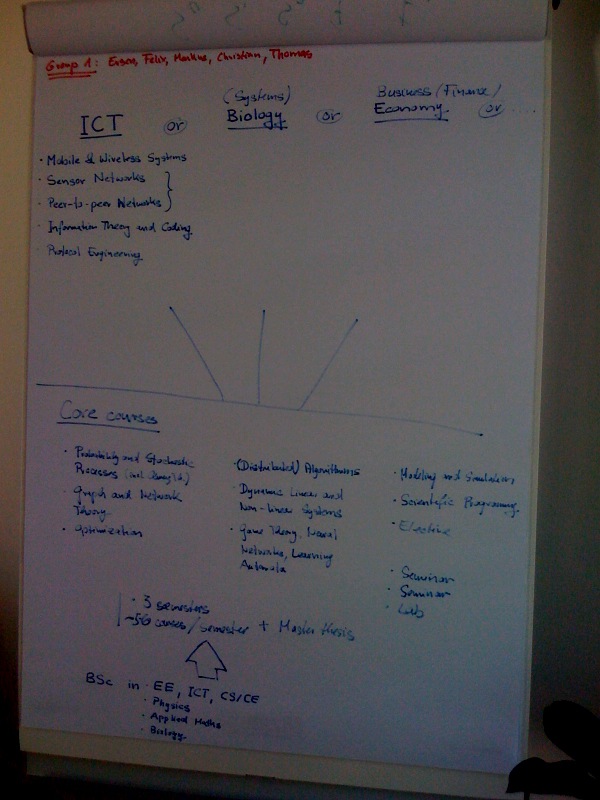Difference between revisions of "Curriculum on Self-Organizing Networked Systems"
From Self-Organization Wiki
(→Group ??) |
|||
| Line 32: | Line 32: | ||
All courses should specifically deal with applications towards SOS. | All courses should specifically deal with applications towards SOS. | ||
| − | == Group | + | == Group 2 == |
{| class="wikitable" border="1" | {| class="wikitable" border="1" | ||
|- | |- | ||
Revision as of 12:10, 16 July 2009
Contents
Final Result
Core Courses
The following courses are mandatory:
Introduction to Self-Organizing Networked Systems
- Part I: What is a self-organizing system? Methodology and theory. Links to following courses.
- Part II: Case studies. A ring lecture with speakers from different universities and different fields.
Dynamic Systems (Lecture and Lab)
Content: similar to "Nonlinear Dynamics and Chaos" by Steven H. Strogatz
Network Theory (Lecture and Exercises)
Content: Networks from the real world. Network topology: Graph theory basics, random graphs, phenomena small wold and scale-freeness. Network functions/processes/algorithms: E.g. search, percolation.
Information Theory and Coding (Lecture and Exercises)
Social Interactions
Content: Game theory, ...
Catch-up Courses
Depending on the background of the student, she or he attends a subset of the following courses:
Group 1: Bauschert, Bettstetter, Pletzer, Quaritsch, Yanmaz
Group 2: Anton, Manfred, Felix, Johannes,Alain
All courses should specifically deal with applications towards SOS.
Group 2
| Subject | Type | g2 und.grad | g2 grad | g2 grad spec. | Var4 |
|---|---|---|---|---|---|
| Dynamical Systems | Lecture | X | 3ECTS | ||
| Information Theory | Lecture | X | |||
| Algorithms 1 & 2 | Lecture & Lab | X | |||
| Numerical Simulations | Lecture & Labs | X | |||
| Topics course SO in nature/society | Lecture | X | |||
| specified classes (choose two) | |||||
| Network 1 & 2 | X | ||||
| Statistical physics 1 & 2 | X | ||||
| Embedded Systems | X | ||||
| Sensors and Robotics | X | ||||
| Undergraduate | |||||
| Calculus 1 & 2 | Lecture | X | |||
| Statistics | Lecture | X | |||
| Diff. Equations | Lecture | X | |||
| Linear Algebra | Lecture | X | |||
| Programming | Lecture | X | |||
| Natural sciences | Lecture | X |
|
